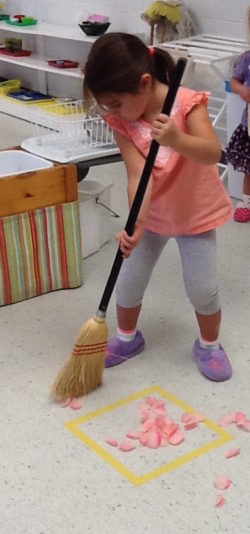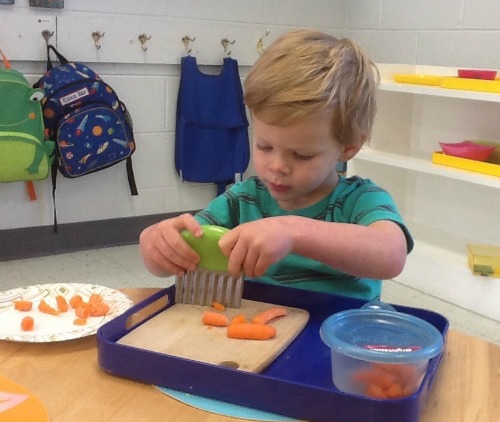“The secret of a happy life is congenial work.”
Maria Montessori
It was Saturday. Saturday was a big day for Spencer because Saturday was the day his family worked together in the garden and yard. Ever since he was a toddler, Spencer was helping…weeding, planting, picking vegetables. Through trial-and-error, and his parents’ patience, he had worked up to raking and hoeing. Today he was going to get to try the small leaf blower, an activity he had watched his older brother do. He had waited a long time for this rite-of-passage and now it was his turn!
Maria Montessori, Italian physician and educational pioneer, knew from her experiences and research with children that “purposeful work” was the work of a child’s life.
This post and tips are brought to you by The Montessori School.
In the classroom, when children had opportunities to do things for themselves, they felt empowered and confident. Also, purposeful work helped them with focus, decision-making, and problem solving.
“Never help a child with a task at which he feels he can succeed.”
Maria Montessori
In much the same way that the teacher in a Montessori classroom encourages the child to make decisions, take action, and be responsible, so can the parent. One way to do this is with purposeful work in the home. Working together to do the daily work of life has many benefits for the child and parents.
 Children love the process of cleaning, not for the end result of having a clean table, for example, but for the experience of the process itself. Learning such a process means following a complicated series of steps. The child learns how to organize himself, make choices based on logic, and follow a pattern. Later, having a mind that can bring order out of chaos will help as the adult pursues higher education or a career.
Children love the process of cleaning, not for the end result of having a clean table, for example, but for the experience of the process itself. Learning such a process means following a complicated series of steps. The child learns how to organize himself, make choices based on logic, and follow a pattern. Later, having a mind that can bring order out of chaos will help as the adult pursues higher education or a career.
One way to help our children with “purposeful work” is with “Big Family Effort Time.” This is time set aside for the entire family to work together as a team to take care of the home! Each member can take on an age-appropriate task.
Here are some tips for success:
- Bring a positive attitude.
- Model expected behavior.
- Be patient.
- Treat the time as important for the family.
- Break big jobs into age-appropriate tasks.
- Expect age-appropriate efforts.
- Give child a visual understanding of what is expected, like a photo of a made bed.
- Practice often.
Sometimes, as parents, it’s hard to imagine how to get a child started and how to know what to expect. As in Spencer’s case, having people around, like a parent or sibling to model the skills needed, sets a child up for success. Here are some other things to keep in mind as you work towards success with “Big Family Effort Time.”
Chore Training:
- Model/show the child how to do the chore until they are ready to try. Break the process up into smaller pieces, if necessary.
- Watch/help them do the chore until they are comfortable.
- Let them do the chore while you watch.
- Let them do the chore independently.
“Don’t do for a kid what your kid can already do, or can almost do.”
Madeline Levine
Montessori ‘s research illustrated that the best thing a parent or educator can do to support a child as she learns, grows, and matures is to provide the best environment in which she can do that. Often when we as adults step in to “help,” we are impeding the child from learning, growing more confident, and gaining a sense of achievement. Allowing children, like Spencer, to fail safely and the chance to try again, allows them to experience success. This success coupled with the idea of what is to come (the leaf blower!) allows children to experience the pride and joy that Spencer did.
Age-Specific Expectations
| Age | Expectations |
| 2-3 years |
|
| 4-5 years |
|
| 6-7 years |
|
| 8-9 years |
|
| 10-13 years |
|
| 14-18 years |
|
| Young Adults |
|
*Adapted from Lindsay Hutton, “I Did It All By Myself!” An Age-by-Age guide to Teaching Your Child Life Skills,” FamilyEducation.com (undated).






















